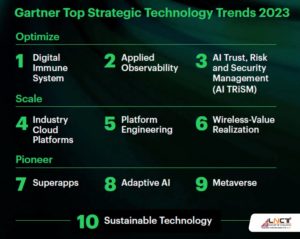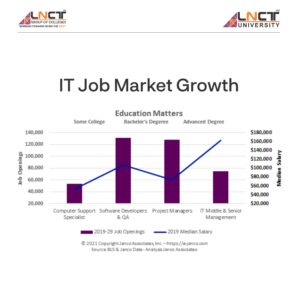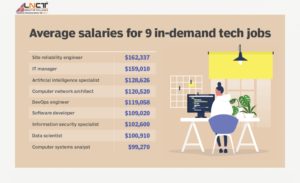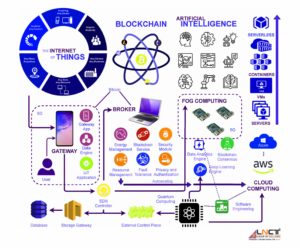Index
- Why choose IT and Computer Science?
- What are the Employment Prospects In Computer Science?
- What are the best IT and Computer Science jobs in the future?
- How can one start a career in IT and computer science?
- Final Reflections
There has been a lot of transformation and innovation in the field of Computer Science and Information Technology, in this decade IT is that big thing that is nurturing all the possible developments. Multiple commercial and widely used technologies in the late 90s and early 2000s have become obsolete. Advanced and newer versions along with emerging courses in IT and Computer Science have replaced them.
It is crucial for professionals & individuals pursuing computer science or working in the IT industry to keep a very close eye on these emerging technologies as the evolution is immensely fast. This shift is causing a change in the way everything operates starting from educational institutes such as universities to multiple MNCs with a need to adapt to the advancement in these technologies.
Why choose courses in IT and Computer Science?
A degree/ diploma in any Emerging Course in IT and Computer Science can help people land fascinating jobs in cutting-edge fields like automation, artificial intelligence (AI), user experience (UX) design, cybersecurity, and computer investigation.
Earlier, the graduates of computer science programs have found employment in IT fields like database management and software creation. Although these positions remain of utmost importance, new and exciting employment possibilities for individuals with a computer science degree have emerged as a result of advancements in technology.
The information technology sector is built on innovation, creation, and upgradation. New technologies and their enhancement create new opportunities and give rise to countless innovations that expand career options for people with computer science degrees. Information technology involves all facets of our personal and professional lives now.
The need for IT workers and expertise is increasing as the industry becomes more dependent on computers and technological systems such as automation and AI. In this guide, we’ll look at a few of the Emerging Courses in IT and Computer Science currently in demand in the UK’s High-Tech Corridor and elsewhere and will continue to grow through 2022 and beyond.
What are the Employment Prospects In IT and Computer Science?
Graduates in computer technology are among the most marketable and employable. 80% of the computer science degree recipients find work within six months of earning their degree, according to HESA data on the employment locations of grads.
Opportunities in computer science are among the most in-demand and well-paying, here a global average annual income of £45,000. Institutions of higher learning are extending their offerings in computer science to include classes on cutting-edge technologies.
New technologies are developing every year, and the disciplines of IT and computer science are expanding quickly. There is an increasing demand for individuals & experts in these fields due to the development of artificial intelligence, big data, cloud computing, and the Internet of Things. We’ll talk about some of the upcoming computer science and IT courses in this blog.
Analytics and Data Science:
The trendiest areas in IT and computer science right now are data science and analytics. Utilizing cutting-edge methods and technologies like machine learning, deep learning, and statistical analysis, this discipline deals with the extraction of insights such as data, information, facts, figures, statistics, and knowledge from data.
There is a considerable need for professionals in this subject in a number of sectors, including banking, healthcare, retail, and transportation.
The use of machine learning and artificial intelligence
Artificial intelligence (AI) and machine learning (ML) are gradually but steadily changing the technological landscape. They have great promise for a variety of businesses. AI entails the creation of intelligent machines that are capable of carrying out activities that traditionally require human intellect, such as speech recognition. Statistical models and algorithms are developed as part of ML.
Blockchain
Blockchain is a distributed ledger technology that could radically alter how transactions are carried out. Supply chain management, identity verification, and financial transactions are just a few examples of the many applications of this secure and open technology in daily life. The demand for experts who are familiar with the blockchain industry is increasing.
Blockchain architects, developers, and consultants are included in these industries.
Internet of Things: IoT
The term “Internet of Things” (IoT) refers to a network of actual ” smart things/appliances” that are able to share data and connect with other systems and devices through the Internet due to embedded software, sensors, and other technologies.
These gadgets vary; they might be basic home appliances or complex industrial machinery. IoT specialists estimate that there are already around 7 billion linked devices, and that number will rise to 10 billion and 22 billion by the years 2020 and 2025, respectively which makes the specialization to be quite high in demand.
Quantum Computing
A new discipline called quantum computing takes advantage of quantum physics to carry out calculations that are impossible with conventional computers. It can resolve challenging issues in machine learning, optimization, and cryptography.
There is a growing demand for professionals with expertise in quantum computing. These include quantum software developers, quantum algorithm designers, and quantum physicists.
Virtual and Augmented Reality
The use of virtual and augmented reality is revolutionizing it entails displaying digital data in the real environment. This is in contact with the real world. AR does not require a headset; these are accessed by smartphones whereas VR needs a headset.
Virtual reality, in contrast, involves building an entirely immersive digital world. For a variety of businesses, including entertainment, education, and healthcare, these technologies offer immense promise. VR can be controlled by a system whereas in AR the individual can control his environment
Software Engineering
A field of engineering that specializes in the development of software and related solutions. A software engineer designs, creates, and maintains software, the principles used to develop these software and applications are logical and are derived through engineering.
Software engineers use their knowledge of programming languages, algorithms, data structures, and other technical ideas to create high-quality software solutions.
Mobile Application Development
Mobile devices are now an essential part of our daily lives. These applications are a vital aspect of the digital ecosystem.
Application development involves the creation of software applications. Also, it requires supervision, monitoring, and troubleshooting methodologies.
What are the best IT and Computer Science jobs in the future?
IT Job Market Growth
IT and computer science are rapidly growing fields. There is a constant demand for professionals with expertise in various technology areas. Here are some of the top IT and computer science jobs expected to be in high order in the future.
Cybersecurity Analyst
Cybersecurity specialists will be in high demand as cyberattacks increase in frequency and sophistication.
Computer networks and systems will be shielded from unauthorized access and hacking attempts. Analysts in cybersecurity will need to be up to date on security concerns. They are able to create and put into practice security protocols and processes.
Data Scientist
Data scientists are responsible for analyzing and interpreting large amounts of data to gain insights and develop strategies. They work with complex data sets using machine learning algorithms.
They also use statistical analysis techniques to identify patterns and trends. Data scientists must have expertise in programming languages such as Python and R, knowledge of databases, and data visualization tools.
Cloud Architect
A cloud architect plays a vital role in an organization’s cloud computing system. Their responsibilities encompass working with cloud technology to develop comprehensive cloud adoption plans, determining optimal cloud application designs, and creating robust systems for managing, monitoring, and maintaining the organization’s cloud infrastructure.
Artificial Intelligence (AI) Engineer
Intelligent systems and apps are created and deployed by AI engineers. To automate processes and tackle challenging challenges, they build machine learning algorithms and technology for natural language processing.
Programming languages like Python and Java, as well as machine learning frameworks like TensorFlow and PyTorch, are required knowledge for AI engineers.
Internet of Things (IoT) Engineer
IoT engineers design and develop connected devices and systems. They additionally work on developing sensors, embedded systems, and wireless communication technologies to connect devices to the Internet. IoT engineers must know programming languages such as C and C++ and have expertise in networking and wireless communication protocols.
DevOps Engineer
DevOps engineers are responsible for automating software development processes and improving software quality and delivery. They work on developing and deploying software applications using continuous integration and deployment (CI/CD) pipelines. DevOps engineers must know programming languages such as Python and have expertise in configuration management tools such as Ansible and Puppet.
Blockchain Developer
Blockchain developers work on developing and implementing secure and decentralized systems using blockchain technology. They work on designing smart contracts and decentralized applications (dApps) using blockchain platforms such as Ethereum and Hyperledger. Blockchain developers must know programming languages such as Solidity and have expertise in blockchain platforms and protocols.
Robotics/Mechatronics Engineer
Robotics engineers create and develop robotic systems and robots. They develop artificial intelligence and control technologies to provide robots the ability to work autonomously or with little oversight from humans. Programming languages like Python and C++, as well as knowledge of robotics systems and control methods, are prerequisites for robotics engineers.
UX Designer
UX designers are in charge of creating user interfaces and experiences for software and website programs. To make sure the user experience is simple and interesting, they build wireframes, prototypes, and mockups. UX designers need to be knowledgeable about user research techniques and skilled with design software like Sketch and Adobe XD.
Mobile Application Developer
For mobile devices like smartphones and tablets, mobile application developers create and deploy apps. Using computer languages like Java and Swift, they develop user interfaces and application logic. Developers of mobile applications must be familiar with mobile development frameworks like React Native and Flutter.
How can one start a career in IT and Computer Science?
Entering the realm of computer science can be a big step because, as we’ve seen above, it’s a diverse area with countless job choices.
Making the correct first move is the first step to moving forward. Although pursuing a diploma program or degree program and other Emerging Courses in IT and Computer Science will equip people with the information and abilities they need to succeed in this rapidly changing industry.
They should start perusing the course options, attending lectures, and working with classmates from around the globe only when they have decided on their field of choice. Along the way, They would experience assistance, and after earning a degree, they would be better prepared to find employment in areas related to emerging technologies.
Final Reflections:
New technology will be the main engine of the global economy’s recovery in 2024. The finest technology developments previously stated are likely to rule our way of life in the years to come.
These professions will be in high demand, as will the abilities required for them. Long-term gains will result from their pursuit of education in these fields. In order to prepare for the future in 2024, one must pick and master the appropriate new technology.
Students can increase their chances of securing a high-paying job by learning about the most recent advanced course trends in IT and computer science, as those highlighted in this blog. They can choose to specialize in or take electives in bioinformatics, machine learning, and computer security.
Numerous universities in Bhopal, including LNCT, provide extensive computer science courses with a focus on robotics, cybersecurity, and artificial intelligence. These programs cater to students who have a strong interest in these specialized topics, giving them the chance to pursue full degrees in their fields of study.






